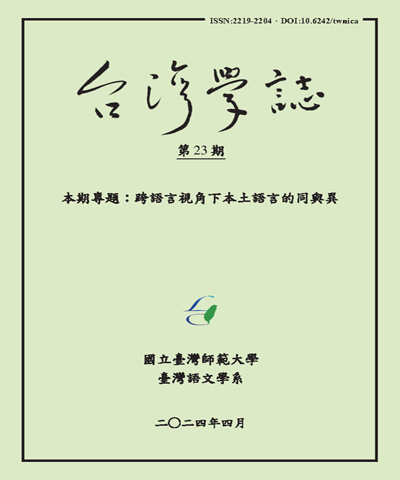
台灣學誌/Monumenta Taiwanica
國立臺灣師範大學臺灣語文學系,正常發行
選擇卷期
- 期刊
〈Chinese Names of Streets in Penang〉是Lo Man Yuk佇1900年發表佇《Journal of the Straits Branch of the Royal Asiatic Society》頂頭ê資料,重點是咧記錄檳城ê路名。檳城主要ê使用語言是福建話,除了漢字,嘛用「白話字」來標記百若冬前檳城福建話ê讀法。咱對這份資料會使看著一寡仔語言現象,親像毋但有漳州腔、廈門腔ê特色,嘛有「角美腔」。彼當陣ê福建話面對馬來話,有製造新詞ê能力。吸收外來語詞ê策略是「譯音法」kap「音兼意譯法」。親像「Ara Kuda」直接吸收做「亞刺古打」À-lah kú-tá,這是「譯音法」。「Carnarvon Lane」對應做「Kampong inside」,「Kampong」是馬來話「庄頭」ê意思,福建話共寫做「鑑光內」Kàm-kong lāi,是共Kampong照音翻譯了後,才加上福建話表示佇內部ê「lāi」來形成新ê詞。這是「音兼意譯法」。路名的號名kap生活經驗、族群有關係。「人」是文化ê創作者,佇遮欲討論ê文化語詞,是以「人」做中心,分做「穡頭」、「族群、方言群」、「公司、組織」、「宗教」kap「人名」這五種類型。舉例來講,親像有「打石街」Phah chióh ke、「潮洲街」Tiô-chiu ke、「姓陳公司」Si^n Tân kong-si、「觀音亭前」Koan im têng chêng、「亞貴街」A kui ke這寡文化詞彙。本文主要欲按〈Chinese Names of Streets in Penang〉這份資料了解19世紀檳城福建話ê語言現象kap文化語詞。遮ê語言、文化語詞會使予咱對檳城華人ê生活有koh較濟ê了解。
- 期刊
This paper intends to investigate a usage of sī "be" in Taiwanese, which occurs higher than speaker-oriented adverb(ial)s and need not adjoin to vP in a wh-question, contrary to its non-copular homonyms (Lee, 2005). I suggest that it can be analyzed based on the denotation of FOR-SURE really, which conveys the meaning: "it is for sure that we should add to Common Ground that p," proposed in Romero and Han (2004). The analysis not only explains all the empirical disparity observed between this sī and other non-copular usages of sī but also reveals the existence of a pragmatic marker in Sinitic languages, which indicates a result of high degree of grammaticalization of sī, an item whose cognates have also evolved into a wide spectrum of functions / distribution in today's Sinitic languages.
- 期刊
本文以宋存壽導演之《庭院深深》一片為研究對象,探討電影與瓊瑤原著小說之差異。瓊瑤小說為歌德羅曼史,富有濃烈個人風格。瓊瑤式愛情具暴烈性質,虐心亦虐身,常以身體之強烈反應代表浪漫愛的極致激情。此外,此書之情節與場景充滿廢墟、鬼魅、懸疑、秘密等典型歌德元素;女主角也與女配角-即二位柏太太-處於二元對立位置。宋存壽電影除去浪漫愛、削弱歌德氛圍、改成家庭矛盾與女性情誼的主題。片中呈現男主角的自私霸道,以及二位柏太太相互的瞭解支持。電影結局看似大團圓,導演卻以四個停格將男主角孤立於母女親情之外。電影因而可說是反羅曼史,批判父權制度下男性的自私與自以為是,暴露世代與性別的矛盾,強化女性情誼與母女親情。

